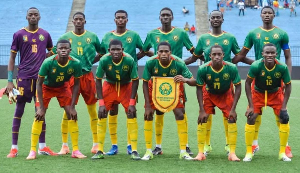Prof Ndiva Kofele Kale, counsel for imprisoned Marafa Hamidou Yaya, has reiterated that the Government of Cameroon must respect the decision of the UN Working Group on Arbitrary Detention, WGAD, and release Marafa “without delay”.
Prof. Kale was reacting to declarations made by Government Spokesman and Minister of Communication, Issa Tchiroma Bakary, at a press conference he granted on July 15. Tchiroma had called the press conference to react to the decision of the United Nations WGAD, which issued a decision on June 2, 2016, requesting the Government of Cameroon to release Marafa.
Tchiroma stated that “MARAFA was sentenced to a 20-year term imprisonment on May 18, 2016, for intellectual complicity and embezzlement of public funds to the tune of some 29 million US Dollars ? about 14.5 billion CFA Francs ? a sum which was meant for the purchase of a Boeing Business Jet 2, known as BBJ-2, for the trips of the Head of State. This ruling was issued at the end of this procedure which has today become final, given that it was a verdict of the Supreme Court.”
Tchiroma averred that “While the proceedings were underway in Cameroon, Mr. Marafa Hamidou Yaya reported to United Nations’ Working Group on Arbitrary Detention, in order to be granted the status of political prisoner rather than ordinary litigant.
Mr. Marafa opines that none of the charges levied against him within the framework of the lawsuit for the embezzlement of public funds are grounded, holding that his only crime is to have expressed his Presidential ambitions.”
Dismissing the decision of the WGAD, set up in 1991 by the UN Commission on Human Rights, Tchiroma said: “It should be noted that the United Nations Working Group on Arbitrary Detention is not a conventional body, that is to say an international body established by a treaty, be it a convention or a covenant and whose composition emanates from the will of State parties to the said convention or covenant. Besides, the Working Group is not a court, and even less, a supranational jurisdiction.”
Prof. Kale describes Tchiroma’s declaration as “… political ‘spin doctoring’ at its worst and a poorly-disguised attempt to confuse and distract the Cameroonian public from the real issues at stake.” The man of law states that Tchiroma’s declaration “exudes the unmistakable aroma of a rearguard campaign to dilute the legal significance of this Decision from the point of view of the Law of Nations.
The press statement repeats, gosso modo, the same worn-out arguments the Government of Cameroon, GOC, presented to the Working Group in their spirited response to Mr. Marafa’s submission; the same arguments its lawyers raised in the Mfoundi High Court as well as the Supreme Court.
There is nothing de nouveau here! Will someone please tell Mr. Tchiroma that the Marafa case is now res judicata and he should stop re-litigating it in the press? It should be recalled that when seized of the matter, it took the WGAD almost six months of careful and methodical examination of the Government of Cameroon’s arguments as well as those of Mr. Marafa’s counsel.”
Kale specified that this was done by “five eminent and reputable U.N.-appointed jurists, as impartial and independent as they come.” After the careful examination, he said, the judges “concluded that Mr. Marafa had been denied his right to a fair, public trial by competent, impartial and independent judges, in clear violation of Government of Cameroon’s solemnly and voluntarily-assumed obligations under Article 10 of the Universal Declaration of Human Rights (UDHR) and Article 14 of the International Covenant on Civil and Political Rights, ICCPR. Both of these provisions speak to Mr. Marafa’s right to a fair and public trial by competent, independent and impartial judges.”
Kale further argues that “International law is nothing more than the law which States themselves, Cameroon included, have agreed to be bound by, either expressly (in treaties) or impliedly (by their conduct). When Cameroon joined the United Nations in 1960, she expressly agreed to be bound by the Charter of the United Nations, the constitution of the world.”
The man of law submits that “When sovereign States enter into treaty relationships, their conduct is regulated by the doctrine of pacta sunt servanda. The doctrine of pacta sunt servanda enjoins States parties to a treaty from invoking their internal law as justification for failure to perform.
Having been found in violation of her obligations under the UDHR and the ICCPR, I hope Mr. Tchiroma’s press declaration is not intended as an alibi for GOC to brush aside the Decision of the Working Group” He says, “Without this reciprocal expectation that States will respect their treaty obligations, the community of nations would become nothing more than a Hobbesian jungle governed by a Darwinian paradigm where only the strongest and fittest States survive.”
Kale intimates: “On a moral level, it is too late for Mr. Tchiroma to raise a cloud over the legal significance of the WGAD’s decision. That should have been done long before the GOC agreed to participate in the proceedings.”
He maintains that “It bears emphasising that the Government of Cameroon could have done as it did in both the Thierry Atangana and Lydienne Eyoum petitions that preceded Mr. Marafa’s at the WGAD where the Government ignored repeated requests from the WGAD to file an answer.
However, Government cannot now ignore this ruling because it went against her. What if Nigeria had refused to respect the International Court of Justice’s judgment on the Bakassi Pennisula?”
The international legal luminary and professor of law surmises: “Respect is usually earned: here then is an opportunity for the Government of Cameroon to demonstrate its unflinching commitment to the Rule of Law and its deep and abiding attachment to the doctrine of pacta sunt servanda by releasing Mr. Marafa Hamidou Yaya, without further delay.”
Actualités of Wednesday, 20 July 2016
Source: cameroonpostline.com













